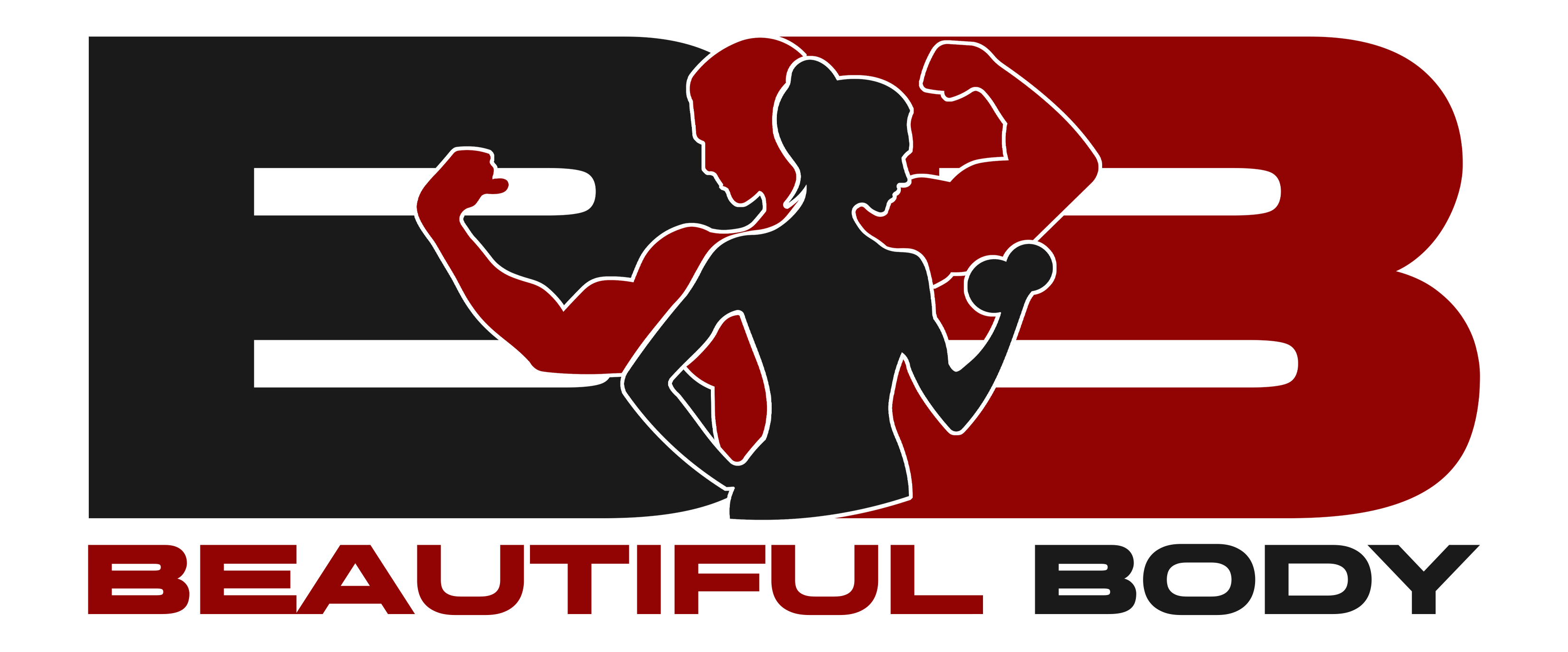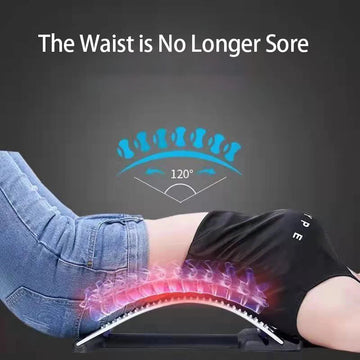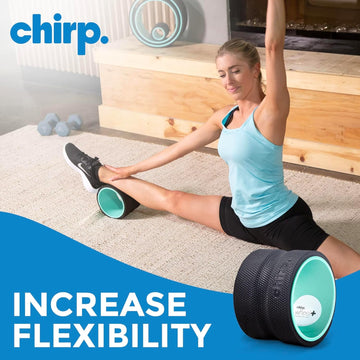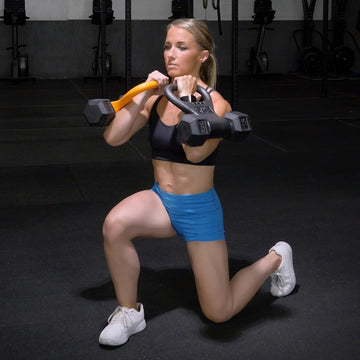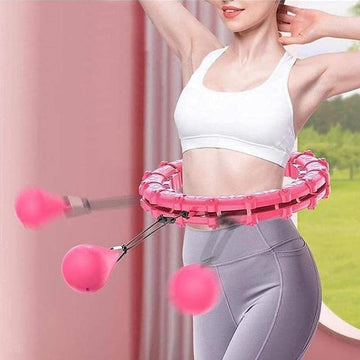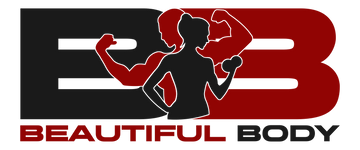Whether it’s desk posture, deadlifts, or just the grind of daily life, back tension is a universal struggle. Enter the world of the lumbar stretcher—a tool that promises to undo all that spinal stress.
But do back stretchers actually improve spine health, or are they just another TikTok wellness trend? From the classic back stretching machine to the modern spine stretcher device, we’ve tested and broken down what works—and what doesn’t.
This full review covers how to use a back stretcher for lower back pain, how a machine that stretches your back compares to other gear, and whether you really need that fancy back decompression table.
Let’s find out which is the best back stretcher for your body, your budget, and your back.
Understanding the Lumbar Stretcher: What It Is & How It Works
What is a lumbar stretcher or spine stretcher device?
A back stretcher is usually a curved platform or adjustable arch where you lie down, allowing gravity to gently pull your spine into alignment.
A spinal stretch device might sound more intense—but in most cases, it’s just a fancier name for a similar function.
If you're comparing a lumbar stretch machine vs. an arch back stretcher, here’s the real talk:
|
Device |
Flexibility |
Portability |
Intensity Level |
|
Arch Back Stretcher |
Medium |
High |
Light to Medium |
|
Lumbar Stretch Machine |
Low |
Low |
Medium to High |
Both help with back pain relief, but if you're starting out, an arched back stretcher might be your best bet.
Anatomy of a Lumbar Stretcher
Most back arch stretchers are made of durable plastic or foam, curved to fit the natural shape of your lumbar spine. Premium models add acupressure nodes or a massager machine for back, offering a deep-tissue release.
Some models, like the folding stretcher or portable stretcher, make storage and travel a breeze. Others, like the spine stretcher table or machine to stretch back, are more heavy-duty and suited for home gyms or physio setups.
Look for:
-
A multi-level back stretcher for different arch intensities.
-
Soft foam padding for comfort.
-
Extra features like massage nodes or lumbar extenders.
Types of Stretchers for Back Pain Relief
There’s no one-size-fits-all tool. The market’s full of options:
-
Back stretching machines: Think proflex stretching machine or teeter back stretcher—more advanced and often inversion-style.
-
Lumbar back massager: Combines support and vibration or heat, like the heated lower back massager.
-
Neck and back stretcher: A two-in-one that targets upper and lower areas.
-
Orthopedic back stretcher: Typically more rigid and clinically shaped for spine alignment.
Each has a role depending on your needs. If it’s sciatica, a sciatica back stretcher works wonders. Tight upper traps? You’ll want a back stretcher upper back model.
Do Back Stretchers Actually Work?
What Does Science Say About Back Stretching Devices?
Research on spinal decompression therapy is promising. When you lie on a machine that stretches your back, the discs between vertebrae are given a chance to breathe—literally. That decompression may reduce pressure on nerves and allow nutrients to flow better into spinal tissues.
Think of it as traction for the modern desk jockey. Plus, adding features like weighted heating pads or EMS stretchers (which use electrical muscle stimulation) can accelerate muscle recovery.
The benefits of back cracking tools or body stretchers aren’t just hype. Done right, they can:
-
Improve posture
-
Reduce nerve impingement
-
Ease muscle tightness
User-Reported Results & Back Stretcher Before and After
People often notice results in the first few uses. Here’s what’s commonly reported after using a back stretching apparatus consistently:
-
Fewer episodes of stiffness in the morning
-
Less lower back pain when standing or sitting
-
Easier movement during workouts and daily activities
Users say the biggest benefits come when they combine stretching with strength and posture work. That’s where pairing a lower back stretch machine with tools like adjustable lumbar support belts or floor back stretchers really shines.
The Spine and Stretching: Is It Healthy?
Is Stretching the Spine Good or Harmful?
The answer? It depends how you do it.
Decompressing your spine through a spine deck or back stretch machine is generally safe when used properly. However, overextending or using too much force (like with aggressive rib stretchers or poorly aligned tools) can irritate the spine.
When done gently, using tools like a thoracic back stretcher or arched back stretcher, spinal stretching can help:
-
Reverse compression caused by long sitting hours
-
Loosen tight spinal muscles
-
Improve blood flow to spinal discs
Can Stretching Realign Your Spine Naturally?
Not in the "crack-it-back-into-place" way you’re thinking, but yes, regular use of a back arch stretcher or yoga back stretch can nudge your posture in the right direction.
Think of it as a habit. Use a back stretching device daily, and over time, your muscles adapt. The arch becomes more natural. You walk taller. You slouch less.
A back stretching machine offers deeper, more controlled support, while a yoga back stretch is perfect for daily flexibility training.
How Back Stretchers Affect Your Spine Over Time
Here’s where things get exciting. Using a back stretcher for lower back pain daily has shown these long-term benefits:
-
Reduced lower lumbar tightness
-
Less nerve-related pain like sciatica
-
Stronger awareness of posture during sitting and standing
One user tracked her back stretcher before and after the journey and found she could finally deadlift without discomfort—something she couldn’t do for years.
Comparing the Best Back Stretchers & Decompression Tools
Stretching Machine for Back vs Back Stretcher Wheel vs Back Stretching Table
|
Device |
Intensity |
Ease of Use |
Best For |
|
Back stretching machine |
High |
Medium |
Serious decompression |
|
Back stretcher wheel |
Medium |
Easy |
Flexibility + balance |
|
Back stretching table |
Very High |
Low |
Home inversion therapy |
If you're tight on space, the back stretcher wheel wins. If you want something clinical, the stretching back machine or spine stretching machine gives deeper decompression.
Back Magic Support vs Electric Lumbar Massager vs Massage Stretcher
Here’s where comfort meets utility.
-
Magic back support is simple, effective, and portable. Great for everyday use and beginners.
-
Electric lumbar massager adds vibration and heat—perfect for post-workout soreness.
-
A massage stretcher combines arching and acupressure therapy, giving you that deep release after sitting all day.
Use them interchangeably. Stack your routine like this: 5 minutes on your arch back stretcher, 10 minutes with your back massager vibration, and finish with a backward stretch on your mat.
The Best Budget Option: Back Stretcher for Back Pain Relief – $60.99
In Image: Back Stretcher for Back Pain Relief
This tool might not have bells and whistles, but it nails the basics. Its multipoint nodes target pressure areas around the lumbar region, making it ideal for:
-
Those new to back stretcher equipment
-
Users looking for a travel-friendly portable stretcher
-
People wanting a durable yet minimal setup
One user said,
"I used this every evening on the floor for 7 days straight, and my lower back unlocked like magic. Easily the best back stretcher I’ve tried under ₹5,000."
Another shared,
"It helped me go from stiff mornings to standing tall at work. Definitely a game-changer."
What to Look for in a High-Quality Lumbar Stretching Device
Key Features to Consider
Before you buy, check these:
-
Multi level back stretcher adjustment (3+ settings is ideal)
-
Compatibility with a weighted heated massage pad
-
Non-slip base and ergonomic curve
-
Soft foam or EVA surface
-
Portability and ease of cleaning
An arched back stretcher with proper spine support prevents overextension and boosts comfort. If it fits under a desk or in your gym bag, bonus points.
Fixed vs Adjustable Stretchers
Let’s compare:
|
Feature |
Fixed Stretcher |
Foldable Stretcher |
|
Portability |
Low |
High |
|
Customization |
None |
Adjustable arch |
|
Cost |
Cheaper |
Slightly more expensive |
|
Who it’s for |
One-size fits all users |
Those who want progression |
If you’re unsure, the foldable stretcher wins. It evolves with your flexibility.
Bonus: Back Stretcher Machines with Acupressure Nodes
Lumbar Massage Stretcher with 8 Acupressure Nodes – $106.99
In Image: Lumbar Massage Stretcher with 8 Acupressure Nodes
This one blends passive spinal decompression with deep-tissue therapy. Its eight-point node system applies consistent pressure to your lower back, promoting:
-
Blood flow
-
Muscle relaxation
-
Nerve relief
One reviewer said:
"Feels like a chiropractor visit—without the bill. The massage stretcher hits all the right points without being harsh."
Another added:
"Using this with my weighted heating pad with massage after work is pure bliss. Worth every penny."
Complementary Tools to Boost Lumbar Stretching Results
Adjustable Waist Support Belt – $22.99
In Image: Adjustable Waist Support Belt
After stretching, your body needs to hold that alignment. That’s where this belt steps in. It supports your lumbar curve during long hours of standing or lifting, reducing post-stretch slouching.
It’s lightweight, breathable, and pairs great with a back stretcher bench or spine deck.
Another bonus: wear it during workouts to keep your form sharp and protect your lower spine.
Heated Lower Back Massager and Weighted Heating Pads
Adding heat therapy enhances circulation, reduces inflammation, and helps your spine relax faster.
Try combining:
-
A homedics back heat massager after a back stretch arch
-
A lower back massager with heat post-decompression
-
A visage weighted heating pad for bedtime spinal relief
The homedics lumbar cushion is also a great desk companion for those working long hours.
EMS Machines and Back Massagers
These gadgets stimulate muscles and loosen up fascia around your spine.
Use an:
-
Electric lumbar massager to release deep tension
-
Back brace massager to maintain upright posture
-
Lower back massager finds for budget-friendly options
A good massager machine back can be your backup when you skip your stretches—and hey, we all do sometimes.
Daily Stretching Routine: How to Use a Back Stretcher Safely
How to Use Back Stretcher the Right Way
Using a back stretcher board or back stretch bench isn’t rocket science—but it does need to be done properly to avoid strain. Most people mess this up by rushing the process. Here’s how to use your back stretching equipment the right way:
-
Start on a flat surface—use a back stretching mat or yoga mat for comfort.
-
Place the stretcher with the wider base towards your lower back and the arch facing up.
-
Lie down slowly—let gravity gently pull your spine into alignment.
-
Breathe deeply and relax your arms at your sides.
-
Stay for 5–10 minutes max, especially on your first few tries.
A floor back stretcher like the arched back stretcher or lumbar spine stretcher works best when your muscles are warm—try using it after a shower or quick warm-up session.
You can also elevate the experience by placing a weighted heated pad or lower back massager with heat under the arch. This improves circulation and makes the stretch more effective.
Common Mistakes to Avoid
You’re not alone if you’ve ever wondered whether you’re using your spine stretch machine correctly. Here's what to steer clear of:
-
Placing your back stretcher upside down: This throws off the arch and can increase pressure on the wrong parts of your spine.
-
Over-arching your back: A common mistake with rigid tools like the spinal stretcher or back stretcher machine. Always start on the lowest arch setting.
-
Skipping warm-up: Cold muscles = tight fascia = potential injury.
Don’t go from desk to back stretching apparatus without a warm-up. A few cat-cow stretches or using a massage stretcher first can prep your spine.
Bonus: Best At-Home Setup for Lower Back Relief
Use with the Indoor Exercise Cycling Bike – $192.99
In Image: Indoor Exercise Cycling Bike
Want to take your spinal health further? Pair your lumbar stretcher with low-impact cardio. Our Indoor Exercise Cycling Bike is designed for smooth, joint-friendly movement, which boosts circulation and enhances post-stretch recovery.
Add-On Support with Weightlifting Belt – $10.99 & Joint Compression Belt – $39.99
In Image: Joint Belt Support for Women Men Adjustable Diamond Compression
After decompressing your spine, you’ll want to protect that fresh alignment. The Weightlifting Belt adds lumbar support during resistance training, while the Joint Belt keeps pressure evenly distributed across your lower back.
-
Use them during deadlifts, squats, or standing work sessions
-
Prevent muscle fatigue and misalignment
-
Compact enough to stash with your back stretching machines
Frequently Asked Questions About Lumbar Back Stretchers
Q. How Long Should You Use a Back Stretcher Per Session?
A. If you’re just starting, aim for 5–10 minutes per session on your floor back stretcher or back stretching board. Your spine isn’t a rubber band—it needs gentle, consistent work. Start with the lowest arch and move up as your flexibility improves. Over time, you can build up to 15–20 minutes per day, max.
Q. Is It Okay to Stretch Your Back Every Day?
A. You bet—if done right. Daily sessions using a spinal stretch device or back stretching machine are perfectly safe for most people. In fact, consistent use is what makes the biggest difference in posture correction and tension relief.
If you're using something more intense like a machine that stretches your back (e.g. spine deck or back decompression table), then 3–4 sessions per week might be plenty.
Q. How long should you use a back stretcher?
A. Start with 5–10 minutes a day. Gradually build up to 15–20 minutes depending on comfort and results.
Q. Can back stretching realign your spine?
A. Over time, yes. Tools like a spine stretcher or arch back stretcher can help encourage better alignment and spinal awareness.
Q. Is a back stretcher good for a bulging disc or sciatica?
A. Yes, but only with proper use and medical guidance. Look for a sciatica back stretcher or lumbar back stretcher with controlled arching.
Q. What’s the best back stretcher machine for home use?
A. Try a multi level back stretcher or massage stretcher with heat or acupressure nodes. They're simple, effective, and beginner-friendly.
Final Verdict: Should You Try a Lumbar Stretcher for Spine Health?
Using the best back stretcher machine consistently can reduce pressure, increase mobility, and enhance your daily posture—especially when paired with a solid strength and recovery routine. Tools like the back reliever decompression device and back arch stretchers are small investments that pay off big with use.
So yes, if you’re serious about spinal health, a back stretcher for pain is more than just a trend—it’s a low-risk, high-reward addition to your daily routine.
